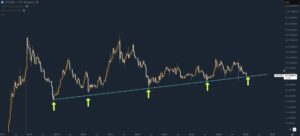Russia has pulled a 180 degree flip on its cryptocurrency approach in a bid to side-step prospective US sanctions should conflict escalate in the contested country of Ukraine.
On Wednesday, Russia announced plans to officially recognise Bitcoin and other cryptocurrencies within its legal framework. The announcement came as a surprise as barely one week prior, the Russian central bank proposed a total ban on cryptocurrencies. At the time, Russian authorities played the typical Western tune, citing ‘anti-money laundering’ and terrorist-financing as causes for concern.
The u-turn, however, has brought up some significant questions relating to the triad of geo-political affairs, fiat-currencies and bitcoin adoption.
Cryptocurrencies aren’t going away. Buy Bitcoin & Litecoin here.
The Ukraine situation
The United States, Russia and China are interwoven in a situation of lowkey contention which so far hasn’t escalated to military conflict. Russia’s official deepening relationship with China is at a point where the two countries “are probably closer now than at any point over the past 70 years“, according to analyst Robert Daly of the Kissinger Institute who spoke on CNBC this week.
The three countries are military and nuclear super-powers, but only the US and China are global economic powerhouses with their respective spheres of influence – so to speak.
For several weeks now, the legacy media has increasing its rhetoric about an imminent Russian invasion of Ukraine. Just yesterday, the UK prime-minister reiterated the country’s support for Ukraine “in the face of Russian aggression“, as titled by the nationalreview.
The Prime Minister warned Russia about the UK’s major investments into collective Western security via NATO, saying “We have the biggest military budget in Europe and the second-largest in NATO. We are the only NATO member that commits the whole of its nuclear deterrent and an aircraft carrier to the alliance.”
This rhetoric is essentially a US-backed proxy that serves to bolster Western NATO support in the region. But that’s not the whole story, as the United States has until now leveraged its political currency – the US Dollar – as a means to deter countries from doing things it doesn’t want. In fact, the current US response is financial sanctions, i.e. potentially excluding Russia from the international fiat-based Swift payment system. Notably, a major caveat is that nobody actually knows the full details as to what is going on between Russia and Ukraine.
With country-wide restlessness, soaring inflation, policy and supply-chain troubles at home, however, Americans have no appetite for another invasion or war. The average American wouldn’t even know where the Ukraine is on a map.
This does not mean Americans, and the peoples of Europe shouldn’t be paying attention.
Regardless, there are profound questions about what the legacy media is talking about with regards to Ukraine. A decade ago, the United States and its allies could cut you off from the global financial system with serious repercussions. This would be a sentence to financial purgatory until a country got in line or changed course.
Russia and China Strengthen ties
But this is not necessarily the case anymore due to China and Bitcoin.
Last week, Chinese Communist leader Xi Jinping sat down with Russian President Vladimir Putin in a show of unity against the West. The Chinese President hadn’t met with a foreign leader in person since the start of the corona-virus pandemic – which originated out of a lab in Wuhan China.
The two countries issued a 5,000 word statement that purports to underline a resolve to operate outside the US Dollar regime. This is the first paragraph:
Today, the world is going through momentous changes, and humanity is entering a new era of rapid development and profound transformation. It sees the development of such processes and phenomena as multipolarity, economic globalization, the advent of information society, cultural diversity, transformation of the global governance architecture and world order; there is increasing interrelation and interdependence between the States; a trend has emerged towards redistribution of power in the world; and the international community is showing a growing demand for the leadership aiming at peaceful and gradual development. At the same time, as the pandemic of the new coronavirus infection continues, the international and regional security situation is complicating and the number of global challenges and threats is growing from day to day. Some actors representing but the minority on the international scale continue to advocate unilateral approaches to addressing international issues and resort to force; they interfere in the internal affairs of other states, infringing their legitimate rights and interests, and incite contradictions, differences and confrontation, thus hampering the development and progress of mankind, against the opposition from the international community.
Should countries begin to create bi-lateral trade agreements that exist outside the US Dollar standard, then sanctions from the global reserve currency would not work. Furthermore, by operating outside the Euro-Dollar standard, those prospective trade agreements would automatically undermine Western financial hegemony and their Global Reserve Currency status would be hampered too.
As of this moment, it is unclear how much of this is posturing as opposed to action. However, it is an important development nonetheless.
Bitcoin and Crypto Are Geopolitically Significant
Besides that, Russia’s u-turn on Bitcoin and crypto also indicates a recognition of the open, permissionless, decentralised payment system that is the Bitcoin network. For years, Bitcoin users have emphasised these infallible properties as superior to those of fiat currencies; and today, a world super-power has chosen to favourably consider these verifiable claims.
While speculative takes approach infinity, it’s increasingly the case that Bitcoin adoption is accelerating at lightning speed.
Regardless of the geo-political situation (i.e. the countries could have been swapped), it’s important to note that ‘sanctions’ are code for ‘censorship’. The United States, Europe, Russia, China and central banks more broadly have the ability to determine who has access to their currencies and payment rails. On a local level which may be more relevant, local banks have the ability to place sanctions on you, the user. One need only look at this week’s GoFundMe censorship campaign against Canada’s Freedom Trucker convoy as an example of political financial censorship.
Bitcoin is censorship resistant money. Short of a world-wide calamity (where nobody wins), there isn’t a single entity that can shut down the system -not one. There are no middle-men, no rent-seekers; and this is true at every level – be it individual or at a state level.
Notably, it is peculiar that the Russian central bank first threatened to ban the peer-to-peer currency, and a week later realised that it may be important to the nation state’s survival. Now, the Russian Central Bank will treat Bitcoin as a foreign currency. Admittedly, the move comes with lots of baggage like regulatory frameworks, licensing for exchanges, taxation, data collection from a state-run surveillance program and other things.
But ultimately, the end game is that Russia will not ban bitcoin and cryptocurrencies. Instead, the country will increase adoption by creating frameworks that everyone can understand (hopefully). Critically, Russia’s policy also opens up a whole can of worms regarding financial privacy. And indeed, Litecoin founder Charlie Lee underlined it as a human right regardless of whether people realise it now, or later.
According to data from Statisa, Russia is the third largest country in terms of Bitcoin Hashing power after Kazakhstan and the United States.
Given Russia’s newfound approach on cryptocurrencies, there is an evolving geo-political dynamic which may force the hand of countries like the United States, the United Kingdom and others. The game-theory doesn’t have to play out provided your adversary doesn’t make that move. But once it’s done, countries are forced to choose between adopting the technology or risk being left behind. Within the globally-regulated fiat ponzi scheme people are forced to participate in, and always at their own expense, central banks are playing musical chairs without securing the soundest money ever on their balance sheet. What happens when the music stops?
El Slavador made Bitcoin legal tender last year. While a big first step, the country has no international significance. If Russia were to adopt Bitcoin as legal tender, the game would be changed entirely and irrevocably.
So who’s next?
Join the telegram channel for updates, charts, ideas and deals.
Did you like the article? Share it!


